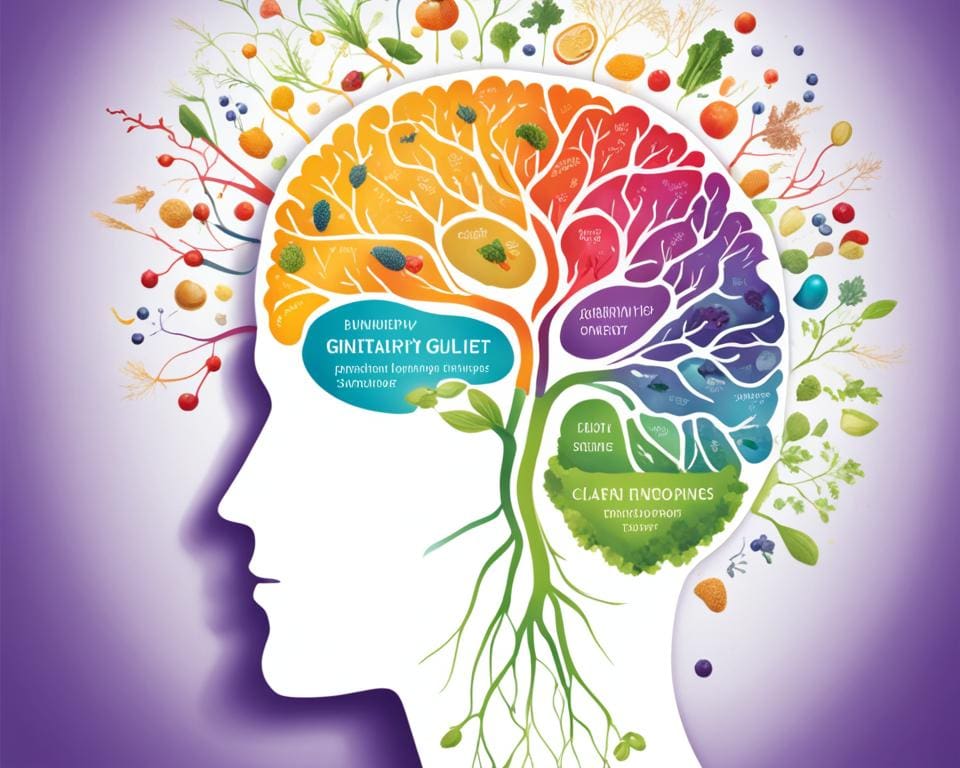Our diet greatly affects our mental health and brain function. Recent research highlights this connection. A poll by the American Psychiatric Association reveals interesting findings. 66% of adults understand the link between mental clarity, brain food, and cognitive enhancement.
81% are willing to change their diet for better mental health. Studies show that eating healthier can reduce depression and anxiety symptoms. One study found significant improvements in depression scores with a Mediterranean diet.
The diet group saw a 20.6-point drop on the Beck Depression Inventory Scale. The control group only had a 6.2-point decrease. This shows how natural supplements and antioxidants can boost mental focus and act as memory boosters.
Depression is a major health issue worldwide, according to the World Health Organization. The American Psychiatric Association is working with nutrition experts. They’re studying the gut-brain connection and how neurotransmitters affect mental health.
Research also focuses on omega-3 fatty acids and their role in brain health. These findings could lead to better mental health treatments through nutrition.
The Link Between Diet and Mental Health
Nutrition greatly affects our mental health. A balanced diet can boost cognitive function and mood. Poor eating habits may lead to fatigue and mood disorders.
A healthy diet improves mental clarity. It can also help with decision-making skills. Eating well supports overall brain function.
Eating Well for Cognitive Function
A nutrient-rich diet supports brain health. Foods like fruits, vegetables, and omega-3s enhance mental clarity. Studies show dietary changes can help adults with depression.
The SMILES trial in 2017 highlighted Mediterranean diet benefits. This eating style improved symptoms in people with major depression.
The Impact of Processed Foods
Processed foods high in sugar can cause inflammation. This may contribute to anxiety and depression. Low-fat diets are linked to increased depression levels.
Moderate fat intake is important for brain function. A balanced diet supports neurotransmitter production. It also reduces inflammation and promotes mental well-being.
The brain-gut connection is crucial. Proper nutrition unlocks our mental potential. It helps us maintain overall health and happiness.

Nourishing the Gut-Brain Connection
The gut-brain axis links our digestive system to our brain. Our gut microbiome houses diverse microorganisms that impact our mental processes. These bacteria produce neurochemicals like serotonin, affecting our emotional well-being.
Stress can disrupt the gut microbiome’s balance, reducing serotonin production. This may increase the risk of depression and anxiety. A healthy gut microbiome is linked to improved mood and cognitive function.
Nourishing our gut through mindful eating supports the gut-brain connection. Consuming prebiotic and probiotic-rich foods can promote better mental clarity. A diverse gut microbiome is key to mental well-being.
Eat whole, minimally processed foods to maintain a thriving gut microbiome. Include fruits, vegetables, whole grains, and healthy fats in your diet. Practice mindful eating to reduce stress and improve your relationship with food.
By focusing on gut health, we can boost our mental well-being. This approach may also enhance our cognitive performance. Prioritizing our gut’s health can lead to overall improvements in our daily lives.









